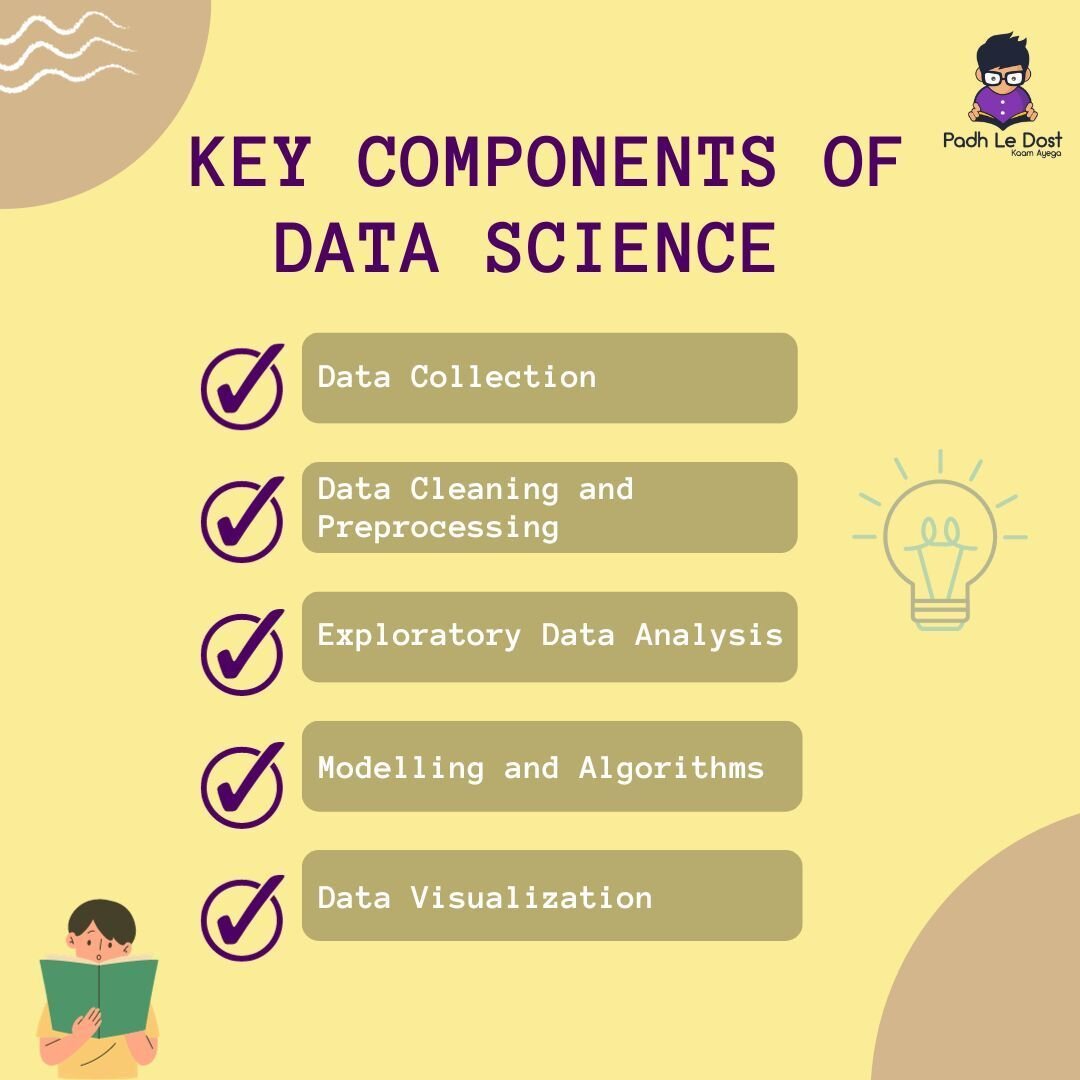What is Decision Science?
Table of Contents

- jaro education
- 2, July 2024
- 9:00 pm
The multidisciplinary course of decision science combines data analysis, predictive modeling, and optimisation approaches to assist organizations in making wise and practical decisions. Decision science converts raw data into useful information using sophisticated statistical techniques and computer tools. This helps organizations solve challenging issues, increase operational effectiveness, and accomplish strategic goals. Implementing decision science, whether used in supply chain management, healthcare, finance, or retail, enables decision-makers to manage uncertainty, reduce risks and seize opportunities, all leading to improved results and a culture of innovation.
In this blog, we will understand what decision science is and its impact on the regular operations of an organization.
Components of Decision Science
Since decision science is an amalgamation of various methodologies and disciplines emerging from various courses, it is crucial to understand the core components that are responsible for the creation of decision science.

Analyzing the systems
Making decisions frequently entails navigating intricate networks of interrelated parts. Systems analysis examines the interconnections, behavior, and structure of complex systems to comprehend them. Decision scientists can use it to determine a system’s fundamental dynamics and how modifications made to one part of the system might impact the whole.
Analyzing the data in decision science
A big part of decision science involves analyzing data. Analyzing data is quite useful as it helps to find pertinent patterns and trends by gathering and organizing the data. The analyzed data helps decision scientists make well-informed decisions based on facts and gain insights into elements that may impact the business’s daily operations.
Behavioral decision theory
Although analyzing the data may offer a numerical method for making decisions, behavioral decision theory concentrates on comprehending the mental and emotional aspects that have an impact on the decision-making process of an individual. It investigates how people view risks, form opinions and assess results. Decision scientists can create strategies that are in line with people’s thought processes and decision-making styles by taking human behavior into account when making decisions. This information can raise the possibility of reaching desired results and enhance the efficacy of decision-making processes.
Application of Decision Science in Various Industries
The role of decision scientists is quite diverse as they have huge applications in various industries. Let’s now take a look at the application of the knowledge of decision science.
- Decision scientists assist the interested stakeholders in determining the solutions to important company queries that ultimately result in improved growth of the business. The concerning questions related to the company may include which department is most likely to see an increase in traffic, or which department is most likely to see an increase in income and effect.
- Decision scientists play a vital role in the retail industry. They help create discounting schemes, price plans, and sales strategies. They are also responsible for ascertaining the appropriate pricing points that will benefit a retail establishment and boost sales.
- Another benefit of decision sciences is the ability to anticipate sales. Inventory management and increased sales are facilitated by the use of historical data in conjunction with the forecasting of patterns, trends, or preferences.
- Decision science also favors the marketing department of a company as it helps in analyzing the emerging trends and patterns that are developed in social media platforms. This trend depicts a vivid image of the interests of the consumers. This data is utilized by the company to increase its sales.
- Decision scientists in the banking sector classify their customers based on customer data and consumer patterns.
- In the finance sector, decision scientists play a major role in assisting banks, insurance companies and investment businesses in making better judgements on investment strategies, risk management and credit evaluation.
- Moreover, the decision scientists are also responsible for attracting and retaining clients by planning relevant interactions and personalized marketing campaigns. In addition to creating a loyal consumer base, a decision scientist also helps in creating goods that can facilitate the expansion of businesses.
- In the healthcare industry, where effective decision-making may have a direct influence on patients’ lives and well-being, decision scientists are indispensable. Decision science models are used by hospitals and other healthcare institutions to maximize patient flow, decrease wait times, and distribute resources effectively.
Skills Required for a Career in Decision Science
There has been a growing demand for decision scientists in various industries due to its diverse range of applications. Here are some of the required skills that are mandatory to acquire for a decision scientist.
- A decision scientist must be proficient in data analysis and statistical methodologies. It is essential to comprehend how to analyze data sets, spot trends, and reach relevant conclusions.
- A decision scientist must have the ability to make wise judgments. This skill requires the capacity to critically assess information, challenge presumptions, and take into account the different approaches towards a particular subject.
- A decision scientist must be equipped with the skills of creating models of prediction and systems for automated decision-making by obtaining knowledge of machine learning techniques and artificial intelligence methodologies.
- One of the most important skills required by a decision scientist is to explain the technical and complex data to the important stakeholders of the company as this data is required for developing crucial decisions that will assist in the expansion of the company.
- Decision scientists need to be skilled in recognising issues, evaluating potential fixes, and choosing the optimal decision based on insights gleaned from data.
- To do their jobs with complete integrity, decision scientists integrate the application of the branches of sciences emerging from math, technology, and business.
Top Careers in Decision Science
There are numerous career options available to an aspirant after studying decision science. Here are some of the popular career options that offer a high-paying salary as well.
Software Developer
Software development is the process of developing software to support workflows and business operations. To fulfill a customer’s particular business objectives, the discipline calls for analyzing requirements, establishing high-level and comprehensive layouts for a project, building software, and lastly, testing the code. Software engineers also need to be well-versed in front-end and back-end development methodologies as well as software architecture. Software developers must do research, create, and manage software projects. They are necessary for executing and testing algorithms that benefit the company.
Data Analyst
Data analysts collect information by querying data and gathering it from several sources. Data is joined, combined, and presented according to different data demands. Statistical data collection, organization, and analysis are within the purview of data analysts. They are also in charge of closely examining the data and assisting the company in data management. It is the data analysts’ responsibility to apply their methods in collecting useful information and providing reports. They are also in charge of gathering the data and doing any necessary analysis or trend identification.
Business Analyst
To learn more about a customer’s business, business analysts undertake preliminary research. They serve as essential connectors in the process of examining the needs and trouble spots of a client’s enterprise. They carry out a comprehensive examination of corporate processes and workflows. They then translate this data into a language that technologists and software architects can comprehend, enabling them to proceed with designing and developing software that satisfies client requirements.
The business analysts have primary responsibility for recognising issues and spearheading their resolution. They are in charge of gathering information, interpreting it, and drawing useful conclusions.
Data Scientist
Manual operations are automated by data scientists. They determine which data sets are appropriate for study and then visualize, categorize, and separate the data using statistical techniques. Owning to the amount of experience they offer to the firm, data scientists stay in a great demand in the market. The job of the data scientists is to identify business problems and to assist in the identification of problems, trends, or patterns. They are also in charge of coming up with fixes for the issues.
Conclusion
Decision science is a strong and adaptable discipline that provides businesses with the instruments and processes required to make data-driven choices. By integrating strategic insights and analytical tools, firms may be able to manage complex and difficult situations, resulting in improved effectiveness and competitive advantage. The influence of decision science will only grow as technology develops, stimulating creativity and a greater comprehension of the data that affects our reality. Adopting decision science improves decision-making procedures and puts businesses in a successful long-term position in a world that is becoming increasingly data-driven.
Due to technological development, an impactful change can be noticed in the operations of the economy. Thus, it would be quite beneficial to adopt a certain set of skills and knowledge that have an application in the practical world. Master of Business Administration (MBA) provided by Chandigarh University will help you gain a global perspective regarding the events occurring in the industry. The 24-month MBA programme aims to provide aspiring business executives with the latest information, useful skills, and strategic perspectives they need to succeed in the fast-paced, international marketplace of the present economy. With cutting-edge facilities, this curriculum is entirely designed by industry experts. The participants also get placement assistance for accelerated career growth after this course.










